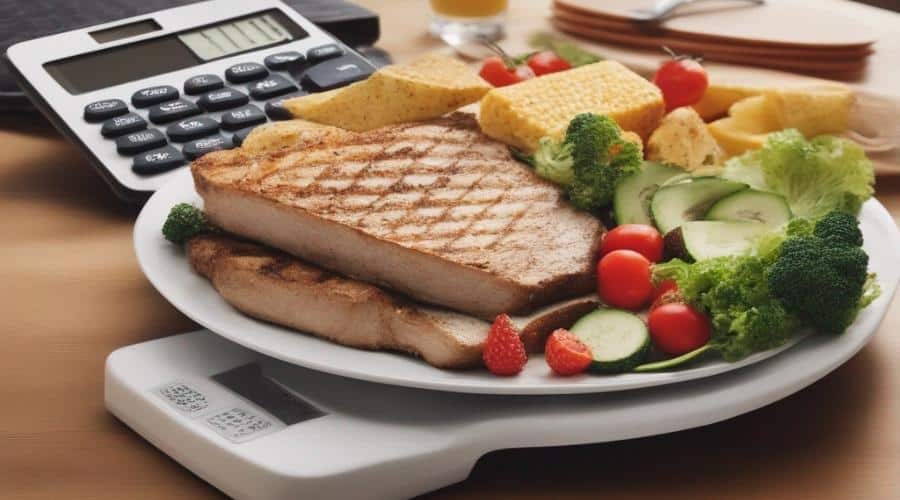Welcome to my Emergency Calorie Calculator! I recently asked myself how many calories per day does my body need to survive? I took it upon myself to do hours of research and ultimately created this handy tool to guide you. Simply enter a few details about yourself, and my calculator will tell you how many calories you need to keep going. Give it a try and take the guesswork out of your food storage and emergency planning!
Emergency Calorie Survival Calculator
Now that you know how many calories you will need to survive over a period of days try our other food and water storage planning tools so that you will be prepared to feed your family no matter what happens.
What It Does:
The emergency calorie calculator is like a personal guide for your food needs. It tells you how many calories you need to keep your body running, especially in an emergency when regular meals might not be available.
How It Works:
- You Tell It About Yourself: You enter details like your age, weight, gender, and how active you are.
- It Uses Special Formulas: It takes your details and uses special formulas (like the Mifflin-St Jeor Equation) to figure out your basic energy needs (BMR).
- It Adds Your Activities: It then adds the calories you burn from moving around and doing things (TDEE).
- It Gives You a Number: Finally, it tells you how many calories you need for a certain number of days. This number is like a food roadmap for your body.
Why It’s Useful:
Knowing how many calories you need helps you plan and store the right amount of food. It’s like packing the right amount of fuel for a road trip. With this calculator, you can make sure you have enough energy to stay healthy and active, no matter what comes your way.
Understanding The Emergency Calorie Calculator
The above calorie calculator tool uses Basal Metabolic Rate (BMR), the Mifflin-St Jeor Equation, and Total Daily Energy Expenditure (TDEE) to calculate how many calories your body needs over a specified period of time to live comfortably.
1. Basal Metabolic Rate (BMR):
Basal Metabolic Rate (BMR) is the number of calories your body needs to function at rest, covering essential functions like breathing, circulating blood, and regulating body temperature. Think of it as the energy your body needs to keep running, even if you’re just lying in bed all day.
BMR is like the number of miles per gallon (MPG) your body gets. Imagine your body is a car. Even when it’s parked and the engine is running, it still uses some gas. Similarly, your body burns calories even when you’re just sitting around doing nothing. It’s the energy needed for basic things like breathing, keeping your heart beating, and maintaining your body temperature. You can learn more about BMR from the Mayo Clinic.
2. Mifflin-St Jeor Equation:
The Mifflin-St Jeor Equation is a widely-used formula that calculates your Basal Metabolic Rate (BMR) based on factors like age, weight, height, and gender. It helps determine how many calories your body needs to function at rest, making it a valuable tool for understanding energy needs.
Think of it as a recipe that takes ingredients like your age, weight, and gender and mixes them together to figure out how many calories your body needs. It’s one of the most accurate ways to calculate BMR and is widely used by experts. You can read more about the Mifflin-St Jeor Equation from NIH.
3. Total Daily Energy Expenditure (TDEE):
Total Daily Energy Expenditure (TDEE) is the total number of calories your body needs in a day, combining your Basal Metabolic Rate (BMR) with the energy expended through physical activity and daily tasks.
Now, let’s say your body’s car doesn’t just sit in the garage all day. You drive it to school, to the park, or maybe even on a road trip. The more you drive, the more gas you need. TDEE is like calculating how much gas you’ll need for the whole day, considering all the driving you do.
It takes your BMR and adds the calories you burn from all the activities you do, like walking, playing sports, or even doing homework. It tells you how many calories you need in a day to keep your body running and do all the things you love. You can learn more about TDEE from Ace Fitness.
Why Is This Important for Prepping?
In an emergency situation, knowing how many calories you need can help you plan and store the right amount of food. It ensures that you have enough energy to stay healthy and active, even when regular meals might not be available. By understanding your body’s energy needs, you can be better prepared for any situation.
Feel free to use the calculator above to find out how many calories you’d need in an emergency. It’s like having a roadmap for a road trip, but for your body’s energy needs!
Understanding Caloric Needs
Calories are like the fuel for our bodies. They keep us going, powering everything from our heartbeat to our brain power. So it is critical to know how many we really need on a daily basis.
How many calories do I need to eat to survive?
The number of calories you need to eat to survive ranges from around 1,200 to 2,500 calories per day for adults, but individual needs can vary widely. Factors that determine your caloric intake are your age, weight, gender, and activity level. It’s not a one-size-fits-all answer, but here’s a general guide:
- Children: They’re growing, so they need more fuel. Boys and girls need different amounts at different ages.
- Adults: Men usually need more calories than women. As we get older, we need fewer calories.
- Active People: If you’re always on the go, you’ll need more fuel. Think of athletes or people with physically demanding jobs.
Basics of Metabolism and Energy Needs
Metabolism is the process of turning food into energy. It’s like a complex engine inside you. Here’s what you need to know:
- Basal Metabolic Rate (BMR): This is the energy you need just to exist. Even if you slept all day, you’d still need these calories.
- Physical Activity: Any movement takes energy. Walking, running, even typing on a keyboard.
- Digesting Food: Believe it or not, you burn calories just by eating. Your body has to work to break down food.
Factors Influencing Caloric Needs
Why does one person need more calories than another? It’s a mix of things:
- Age: Younger people usually need more calories.
- Gender: Men and women have different needs.
- Activity Level: The more you move, the more you need.
- Health Conditions: Some illnesses or medications can change your caloric needs.
Understanding your caloric needs is like having a roadmap for your body’s energy. It helps you know what to eat and when, so you will not only survive any emergency but also so you can feel your best.
Caloric Intake and Survival
When it comes to survival, calories aren’t just numbers on a nutrition label. They’re essentially the energy that keeps us moving, thinking, and thriving. Let’s explore what happens when we play around with those numbers.
Can you survive on 500 calories a day?
Surviving on 500 calories a day is highly unsustainable and can lead to serious health risks. Such a low intake would cause fatigue, rapid weight loss, and long-term problems, making it far below the recommended daily caloric needs for most adults.
500 calories a day is like running on fumes. It’s way below what most people need. Here’s what might happen:
- Feeling Tired: You won’t have the energy to do much.
- Losing Weight: And not in a healthy way.
- Health Risks: Long-term, this can lead to serious problems.
It’s not a sustainable or healthy way to live.

Is 1500 calories enough to survive?
For some individuals, particularly those who are smaller or less active, 1500 calories could be enough to survive, but it’s close to the lower limit for many adults. It depends on these factors:
- Your Size: Smaller people might get by on this.
- Your Activity: If you’re not very active, it might be enough.
- Your Needs: Everyone’s different. Some might need more, some less.
It’s close to the lower limit for many adults, especially men.
Is 1200 calories enough to survive?
For many adult women, particularly those aiming for weight loss, 1200 calories may be considered a minimum daily intake to meet essential nutrient needs. However, this level of intake is often too low for men, active individuals, or those with specific health conditions, and it may lead to fatigue and nutrient deficiencies if sustained over the long-term.
How long Can I survive on 1200 calories a day?
1200 calories is often considered the minimum for some smaller women to maintain health:
- Short-Term: It might be okay for a little while.
- Long-Term: It could lead to nutrient deficiencies.
- Depends on You: Your body, your needs. It might be enough, or it might not.
How long can you live on under 1,000 calories a day?
A person can survive on under 1,000 calories a day for up to a couple of weeks. However, it is highly individual and depends on factors like a person’s starting weight, metabolism, overall health, and activity level. You would likely experience significant fatigue, weakness, and other health issues, making it an unsustainable and unsafe practice.
- Short-Term: You might manage for a bit.
- Long-Term: It’s risky and can lead to health problems.
- Not Recommended: It’s below the recommended intake for almost everyone.
The Risks of Low-Calorie Diets
Eating too few calories isn’t a shortcut to health. It can lead to:
- Weakness and Fatigue: You won’t have the energy to do the things you love.
- Nutrient Deficiencies: You might miss out on vital vitamins and minerals.
- Long-Term Health Problems: Think bone loss, heart problems, and more.
- Minimum Caloric Intake for Different Age Groups and Genders
- Children: They need more because they’re growing.
- Men: Generally need more than women.
- Seniors: Might need fewer calories as they age.
Understanding how many calories you need, and what happens when you don’t get enough, is a key part of staying healthy, happy, and ready for anything.
Planning for Emergencies
Emergencies can happen at any time, and having a plan for your nutritional needs is as essential as having a first-aid kit. Let’s explore how to make sure you have the energy to face whatever comes your way.
Importance of Balanced Nutrition
In an emergency, you might not have access to your usual food. But that doesn’t mean you can ignore nutrition:
- Proteins, Fats, and Carbs: You need all three to stay healthy.
- Vitamins and Minerals: Don’t forget these! They keep your body working right.
- Water: It’s not just about food. Staying hydrated is key. (see best water storage container ideas)
Emergency Food Storage Tips
Storing food for an emergency is more than just piling up cans. Here’s how to do it right:
- Variety: Include different types of food to avoid “menu fatigue.” (Long-term foods, freeze dried foods, dehydrated foods, canned foods, etc.)
- Shelf Life: Choose items that last a long time. (see beans, rice, flour, pasta, wheat, meat, etc.) Don’t forget to use proper food storage practices like using oxygen absorbers with certain dry food storage.
- Special Needs: Think about babies, elderly family members, or anyone with dietary restrictions.
- Cooking: Consider how you’ll cook if the power’s out.
Using the Emergency Calorie Calculator
Our handy calculator can help you plan:
- Calculate Needs: Find out how many calories you and your family need.
- Plan Meals: Use the calculator to help plan balanced meals.
- Stay Informed: Knowledge is power, especially in an emergency.
Use the calculator now!
Additional Survival Calorie Considerations
When it comes to calories and survival, there’s more to the story than just numbers on a page. Let’s explore some other things to keep in mind, whether you’re planning for an emergency or just trying to understand your body’s needs.
What are the signs of insufficient caloric intake?
Not getting enough calories isn’t just about feeling hungry. Here’s what to watch for:
- Feeling Tired or Weak: Your body’s telling you it needs more fuel.
- Difficulty Concentrating: Your brain needs calories too!
- Mood Changes: Irritability or depression can be signs.
- Physical Signs: Things like dry skin or hair loss can be clues.

How to adjust caloric needs based on activity levels?
Your activity level plays a big role in how many calories you need:
- More Active: More calories needed. Think of athletes or those with physical jobs.
- Less Active: Fewer calories needed. If you’re sitting at a desk, you’ll need less.
- Changing Activities: Adjust as you go. More exercise means more fuel.
What types of food provide the best energy in emergencies?
In an emergency, you want foods that provide lasting energy:
- Complex Carbs: Things like whole grains give slow, steady energy.
- Healthy Fats: Nuts and seeds can be great choices.
- Protein: Don’t forget meat, beans, or dairy.
- Avoid Junk Food: It might give quick energy, but it won’t last.
Frequently Asked Questions
BMR is the number of calories your body needs to function at rest. It’s like the baseline energy needed to keep your heart beating, lungs breathing, and body warm.
Men generally need more calories than women due to differences in muscle mass and metabolism. It’s one of the factors that make individual caloric needs unique.
Yes, but with caution. Children and pregnant women have specific nutritional needs, so it’s best to consult with a healthcare provider for personalized guidance.
Your caloric needs can change with factors like weight loss, aging, or changes in activity level. It’s a good idea to reassess every few months or if you notice significant changes in your body or lifestyle.
A low-calorie diet can lead to fatigue, nutrient deficiencies, and long-term health problems. It’s essential to ensure that any diet meets your individual nutritional needs.
The emergency calorie calculator is designed for survival planning, not weight loss. For weight loss guidance, it’s best to consult with healthcare or nutrition professionals.
Storing food for an emergency means considering shelf life, variety, special needs, and cooking methods. It’s about more than just piling up cans; it’s about thoughtful planning.
Sources
- Centers for Disease Control and Prevention (CDC): A leading national public health institute that provides information on nutrition, health, and safety.
- World Health Organization (WHO): An international organization that offers guidelines and information on nutrition and health, including emergency nutrition.
- U.S. Department of Agriculture (USDA): Offers resources on dietary guidelines, food storage, and nutrition through various programs.
- Academy of Nutrition and Dietetics: A professional organization that provides evidence-based food and nutrition information.
- National Institutes of Health (NIH): Offers extensive research and information on dietary needs, caloric intake, and overall health and wellness.

